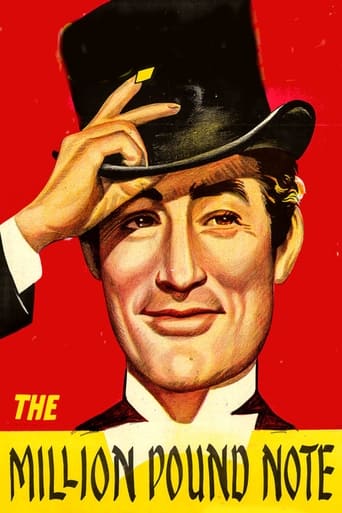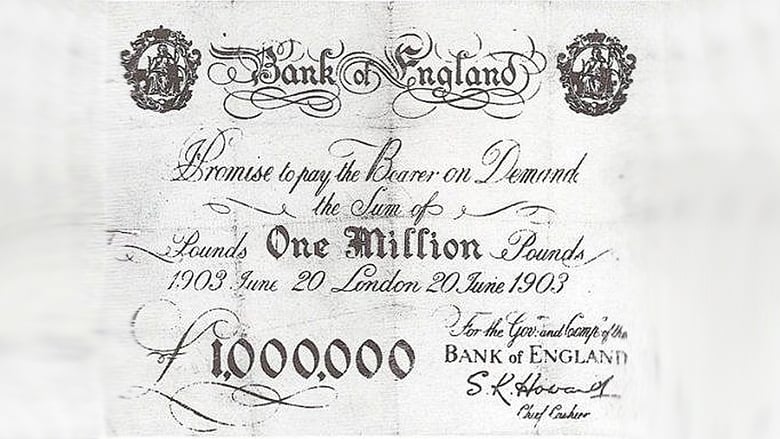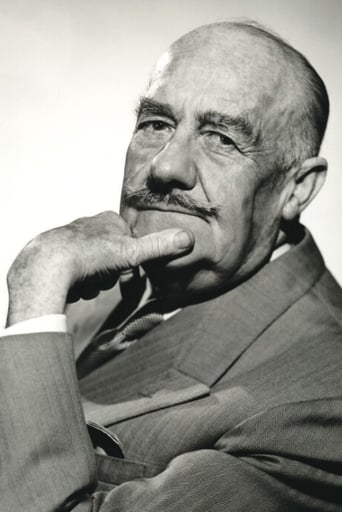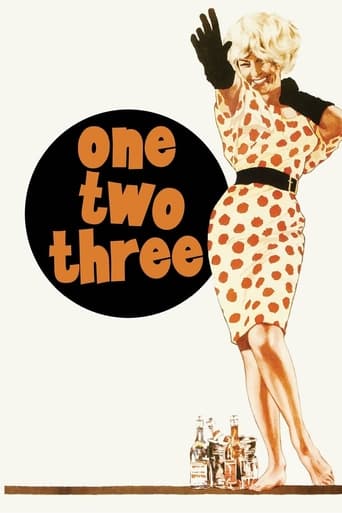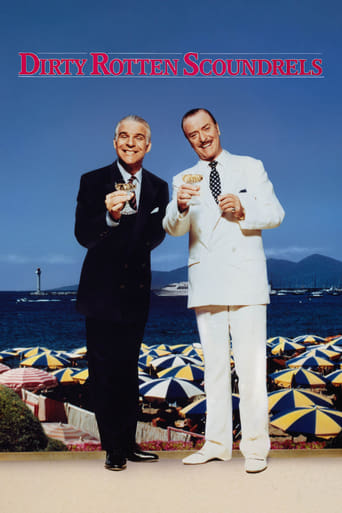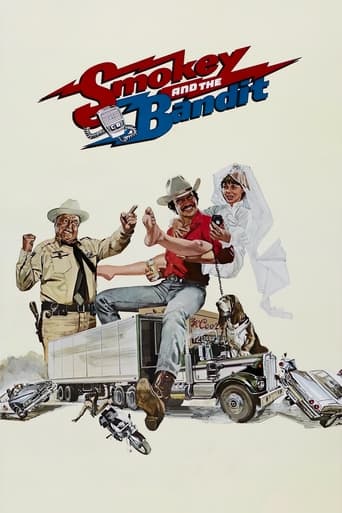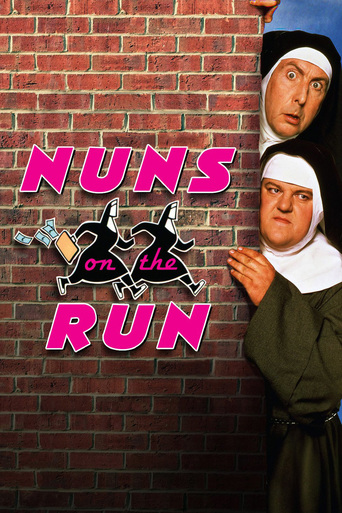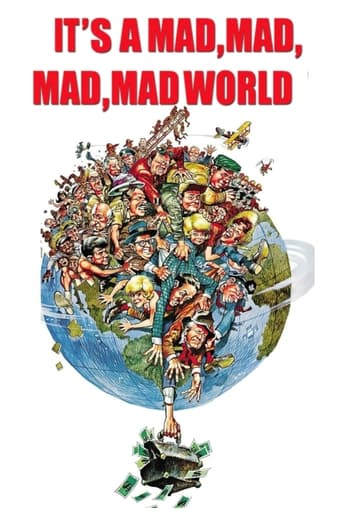The Million Pound Note (1954)
An impoverished American sailor is fortunate enough to be passing the house of two rich gentlemen who have conceived the crazy idea of distributing a note worth one million pounds. The sailor finds that whenever he tries to use the note to buy something, people treat him like a king and let him have whatever he likes for free. Ultimately, the money proves to be more troublesome than it is worth when it almost costs him his dignity and the woman he loves.
Watch Trailer
Cast
Similar titles
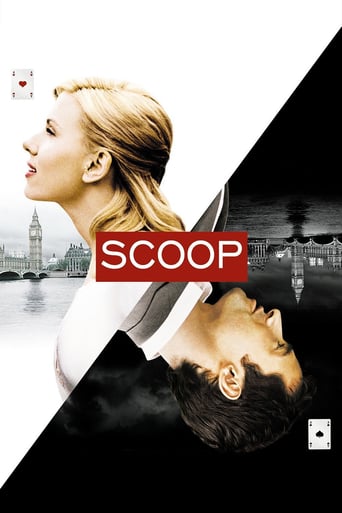
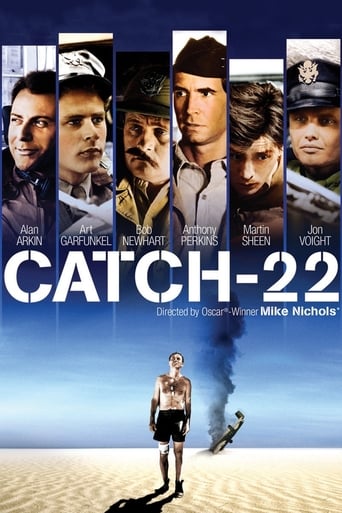
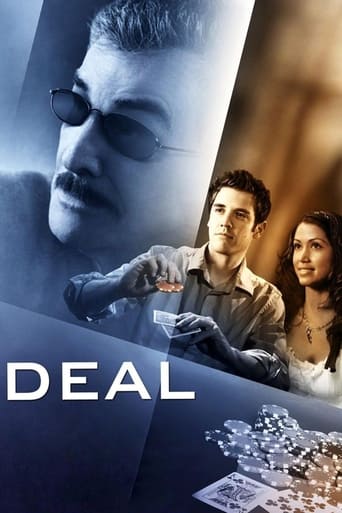
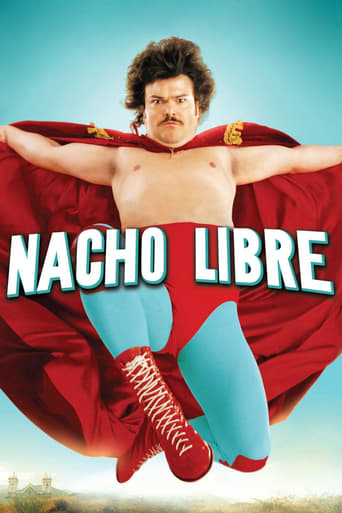
Reviews
Plenty to Like, Plenty to Dislike
Unshakable, witty and deeply felt, the film will be paying emotional dividends for a long, long time.
Easily the biggest piece of Right wing non sense propaganda I ever saw.
There's no way I can possibly love it entirely but I just think its ridiculously bad, but enjoyable at the same time.
I came across this film because the mother was flicking through the channels and we decided to give it a watch. I have to admit, it was alright like. I wouldn't call it the best movie I've ever seen. Although it was good seeing Gregory Peck as the main character, I have never seen him as a young man before but I have to say this is my first movie when he was young.I only saw him on the Omen but nothing else until this!I don't have much to say about this movie but, I do consider it watchable!
Although it stars Gregory Peck, one of America's most popular and charismatic film stars of the period, "The Million Pound Note" is surprisingly little known today; mine is only the 17th review it has received on this site. Part of the reason is that, unlike most of Peck's output, it was not made in Hollywood but in Britain. (Peck made another British film, "The Purple Plain", during this period). Even in Britain, however, few people seem to have heard of it.The film was a based on a short story by Mark Twain. The basic idea, that of two elderly, wealthy brothers entering into an eccentric bet which affects the life of a complete stranger, is similar to that in the later American comedy, "Trading Places". That film was a contemporary satire on the "greed is good" attitudes of the 1980s, but "The Million Pound Note" is a period piece set in the early twentieth century. (The exact date is uncertain. A forty-eight-star flag flying outside the U.S. Consulate would seem to indicate that the film must be set in 1912 or later, but some of the costumes, and the absence of motor vehicles in the streets, would suggest a rather earlier date).The hero is Henry Adams, an American who finds himself stranded in England by an unusual combination of circumstances after a sailing accident and needs money for his passage back home. By chance he meets the two brothers, Oliver and Roderick Montpelier, who give him an envelope, telling him that it contains money. When Adams opens it he finds that it contains a single banknote to the value of one million pounds. (This is a fiction invented by Twain; in reality the Bank of England has never issued notes for such a sum. For the purposes of the story, however, we have to accept that the note is genuine and not a forgery).Like "Trading Places", "The Million Pound Note" is a satire on the capitalist system, but satirises it in a rather different way. "Trading Places" sends up the rapaciousness and heartlessness of the rich, represented in that film by the greedy, avaricious and corrupt Duke brothers. The satire of "The Million Pound Note" is directed less at rich people themselves than at the absurdities of the system through which they have obtained their wealth. While Adams has the note he is taken to be an eccentric millionaire. He can obtain whatever he needs without having to pay for it. (This is the reason for the wager; Oliver has bet the sceptical Roderick that mere possession of the note will enable the possessor to obtain limitless credit)Adams is accepted into the company of England's grandest High Society and is asked to back a business venture when a fellow American wishes to start up a gold mine. He does not actually have to put up any money himself; the mere fact of his association with the project is enough to start a boom in the value of the company's shares. When he temporarily mislays the note and a rumour spreads that he never actually had it in the first place, the share price plummets. It does not matter that a geological report has indicated that the company is actually on the verge of striking gold. What matters to the capitalist system is not reality but belief and confidence. A falsehood that people can believe in can be more persuasive than the truth. Businessmen may like to think of themselves as hard-headed realists, but in Twain's eyes they are as prone to fantasy and delusion as anybody else. Indeed, they are more so, because they operate within a system which depends upon fantasy and delusion in order to function.The film was directed by Ronald Neame who two years earlier had made "The Card". The two films have much in common. Both are based on literary sources, "The Card" on a novel by Arnold Bennett. Both are comedies set in Edwardian England. And both have similar themes, the importance of belief, even credulous or misplaced belief, to the money economy. (Or, to be more accurate, to the credit economy. The very word "credit" is derived from the Latin for "to believe"). Denry Machin, the hero of "The Card", is a young man who makes a fortune by promoting business schemes which, if not exactly dishonest, are nevertheless heavily dependent upon his charm, persuasiveness and plausibility. When one under-capitalised venture seems set to fail, he manages to save the situation by persuading an aristocratic lady to back him. As with Adams, the mere fact of her association with the scheme brings the investors flocking in.I would not rate this film quite as highly as "The Card", perhaps the greatest non-Ealing British comedy of the early fifties. Nevertheless, it has a lot going for it. It has some serious points to make, but makes them in an amusing way with wit and style. Gregory Peck had a wide range as an actor, but he was often at his best playing an ordinary, decent man who finds himself in extraordinary circumstances- "The Big Country" and "To Kill a Mockingbird" are two other examples- and here he makes a charming hero. It is visually attractive, being shot in what would today be regarded as the "heritage cinema" style. It may be little known today, but I would consider that it deserves to be known more widely. 7/10
Yes, even the great Gregory Peck could make a colossal bomb and he sure did it with this 1954 ridiculous nonsense of a film.Two old codgers, one played by the venerable Wilfrid Hyde-White, make a wager to see if someone with a million pound note can get by by not spending it.Along comes a homeless Gregory Peck and the two rues give him the note. It's basically a story of what money can buy. With all that money, Peck seems relevant to society and doors begin to open up for him. As rumors spread that Peck really doesn't have the money, those doors are about to close up until movie writing changes all that.It's an inane film which really lacks any quality.
Two elderly brothers, wealthy English gentlemen, establish a wager. They entrust a million-pound banknote to a penniless American, to see if he can live for a month purely on the good will which the note will engender, without ever having to cash it.Gregory Peck plays Henry Adams, the innocent American, in this stodgy romantic comedy, based on a Mark Twain story. His love interest Portia Lansdowne is played by Jane Griffiths. The film is really just one gag, strung out for 90 minutes - a pauper has no friends, whereas a millionaire is surrounded by sycophancy and limitless credit. Markets deal in confidence, rather than cash.The film is unarguably well-made. The performances are sharp, the incidental music comments neatly on the action and the 'look' is sumptuous. And yet there is something flat about Ronald Neame's direction, and the laughs are rather thin on the ground.Verdict - Ostensibly a good idea, but not enough to support a full-length film.
